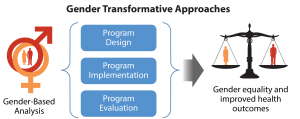New Research Briefs on Gender and Communication for Social Change Aid in SBCC Program Design
 HC3 has published two new research briefs to help social and behavior change communication (SBCC) practitioners decide which research concepts, models and frameworks they should consider when designing an SBCC program.
HC3 has published two new research briefs to help social and behavior change communication (SBCC) practitioners decide which research concepts, models and frameworks they should consider when designing an SBCC program.
Gender Transformative Approaches (GTA) offers guidance for integrating gender issues into SBCC program design, implementation and evaluation. Gender inequality can have a significant impact on the success of an SBCC program, so using GTA can lead to greater equality and improved health outcomes.
The Integrated Model of Communication for Social Change is an iterative process that involves the community to spur social change and support improvements in health and well-being. It is best used in SBCC programs that target problems heavily influenced by community and social factors.
Both briefs are part of an ongoing HC3 Research Primer series that also includes briefs on the Theory of Planned Behavior and Diffusion of Innovations. Case studies illustrate the research concepts in action. Upcoming topics in the series are:
- Social Learning Theory
- Propensity Score Analysis
- Ideation
- Extended Parallel Processing Model (also known as Threat Management)








Leave a Reply
Want to join the discussion?Feel free to contribute!